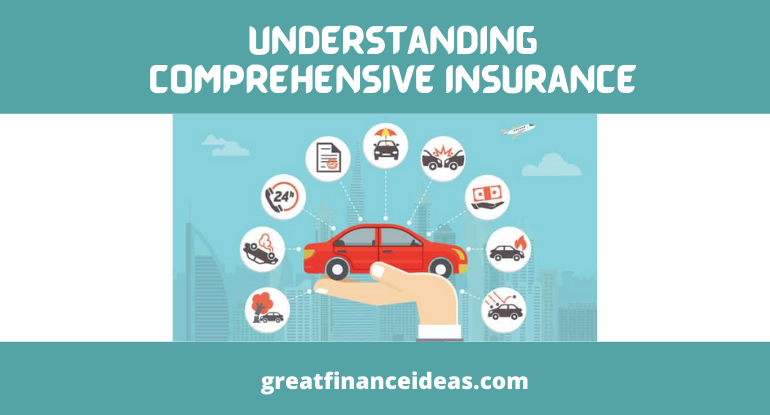Just like collision insurance and liability insurance, comprehensive insurance is the constituent of an automobile insurance policy.
As guided by law in most states, comprehensive and collision insurance becomes optional when you own a vehicle which is not the case with drivers who choose to carry liability insurance.
Table of Contents
What Is Comprehensive Insurance?
Comprehensive insurance is the type of insurance the policy that covers your vehicle in an event of loss or damage. Your vehicle can only be repaired or replaced in an incident that is not a collision but damages that could arise from fire, vandalism, or falling objects of any sort.
The application of comprehensive coverage becomes necessary when you are leasing or financing your car but is termed to be optional when you own your car with an insurance policy.
You may be considering compressive coverage while having an assessment of your existing insurance policy, for a better bargain of auto insurance, find out how well comprehensive insurance work in the area of coverage limit and how deductibles are applied to the coverage.

Key Takeaways
- Purchasing comprehensive coverage may not necessarily make meaning financially if the car you drive is an old one that has already lost a significant amount of value.
- When you finance a vehicle car purchase, you are required to purchase comprehensive coverage and collision coverage.
- Comprehensive insurance is meant to pay for repairs to your vehicle caused by things other than a collision.
- Raising your deductibles for comprehensive insurance could help to lower your premiums.
What is covered by Comprehensive Insurance?
This insurance policy covers the damage to your vehicle of any sort and when stolen. The areas of coverage include:
- Fire
- Theft
- Falling objects
- Vandalism
- Natural disasters such as hurricane, tornado etc.
- Damage to the car caused by animals
- A public disturbance like a mob that results in damage or destruction of your car
What’s not Covered
- Damage to the insured car as a result of a collision
- Damage done to somebody’s vehicle from a collision
- A medical expenses of an accident passenger that was in the car in the course of the damage.
Comprehensive Coverage Deductibles and Limits
You may choose to select a set of deductibles once you purchased comprehensive coverage.
This is the amount of money required of you to cover up the claims of any damage. Assuming the deductible selected is $500, and after a couple of months, your vehicle got damaged by fire and may require $1,500 to fix it. You will now have to pay $500 while the company pays the balance of $1,000.
Read Also: How much does Tesla Insurance Cost? Does the price vary by Model?
Though, comprehensive coverage is limited. The policy limitation for claims does not exceed the actual cost value of the user vehicle.
In circumstances of the theft, you can only be given a refund to the tune of the devalued state of your vehicle outside the deductible.
In another perspective, if you wish to replace your stolen car with a new one and model, be informed that the insurance company cannot take full responsibility for doing so but you may need to use part of your money in addition to the reimbursement from your insurer.
While bearing in mind that, comprehensive deductible and limit are not the same as that of the policy collision deductible and limit.
Choosing a Comprehensive Coverage Deductible
The comprehensive deductible set amount could be on the increase like $500, $1,000, $1,500.
Your decision to go for a higher one will definitely lower your premium which explains further that though money can be saved upfront when it comes to claims, be ready to pay more out of your pocket to cover up any claims.
A lower comprehensive deductible also has to deal with the increase in the amount paid for coverage. Seek further information through an agent to help find a workable deductible and limit that suit your desire.
What is the difference between Collision and Comprehensive Insurance?
The difference between the two concepts is practically simple. Collision coverage has to do with repairing a user’s car in an event of damaged due to an accident that resulted in a collision either with another vehicle or an object and a single-car rollover accident.
Comprehensive coverage on the other hand help covers different types of losses that are usually not as a result of driving the vehicle but due to damaged related issues like theft, hail, falling object or tree, fire, natural disaster, animal damage, etc.
You may also like: How to Find Cheap Car Insurance ultimate guide
Why Buy Comprehensive Coverage?
Considering comprehensive coverage as an option to tread with, find out more for a better decision.
- Comprehensive coverage may be required by your car’s lender.
Your lender can be pleased to have both comprehensive and collision coverage if you are leasing or financing your car and it can last until the car is paid in full. - How old is your car and its worth?
Your choice of investing into both comprehensive coverage and collision coverage may just be the best hence it may be difficult for you to cough out much money from your pocket to foot part of the claims.
- How much are the annual premiums for Comprehensive and Collision Coverage?
Allow an agent to help you out while making your decision on the choice of insurance policy. The role of an agent determines the type of insurance policy that will be cost-effective and better for you.



